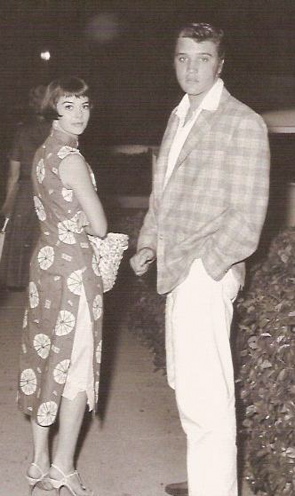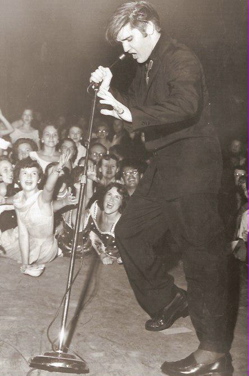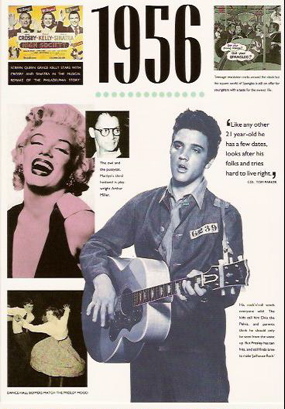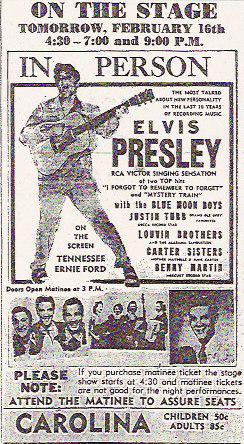In July of 1953, Elvis got a job at Crown Electric Company owned by James Tipler and his wife Gladys. Located at 353 Poplar Avenue in Memphis. The company's phone number was 5-4652. When he first started working there he started as stock boy. He was later promoted to delivery boy. The youngest employee at the company, he was paid $1.25 and hour. While working there Elvis was also studying to be an electrician, Certified electricians earned $3 an hour at that time. On Saturdays Elvis handed his $35.00 paycheck over to his mother. On several of his paychecks in mid-July of 1953, his first name was misspelled as " Alvis." |
jueves, 9 de julio de 2015
Elvis at Crown Electric Company
Christmas 1958
Gladys. Now, he was stationed in Germany as a soldier in the U.S. Army, far from home and
also concerned about his music and film career being on hold.
Elvis' fellow soldiers had decorated the company Christmas tree. They had taken up a
collection and given a party for the orphans in nearby Friedberg. Elvis had visited the
area promoting the new Salk polio vaccine. On the day that some of the men were to go on holiday leave and furlough, they had to have all theirequipment cleaned and inspected and they could not have their passes before 1700 hours.
Some of the guys were humming and singing Christmas songs. One soldier asked Elvis to
show them how he did his Christmas songs. He finished polishing mirrors in the latrine and then joined the crowd. He told them to "make an instrument." Out came spoons, combs with wax paper, and makeshift drums using tent pins for drum sticks. They sang a rock version of "White
Christmas" with great fervor. It was almost 1700 hours and one soldier asked before they
went would Elvis sing "Silent Night." Elvis took the guitar and asked his sergeant to help him. Recalls Sergeant Jones, "Elvis sang as if in a trance, totally oblivious to the spoons, combs, and tent pins...Somewhere along the way the instruments fell silent and only Elvis' voice could be heard. Those going on pass didn't interrupt. They simply walked silently by Elvis, touched his shoulder and walked out the door. Not another word was spoken after the song until Elvis broke the spell. 'Merry Christmas, everyone,' he said. 'Merry Christmas Elvis!'
they replied in unison."
On Christmas day Sergeant Jones came by the barracks to look in on those not on leave. He
expected to find a somber place. Instead the barracks were jumping. Elvis too had
thought of the others with nowhere to go and had stopped by with a visiting movie actress.
He took the time to introduce her to each soldier before they were off to see a show in Frankfurt. After he left one soldier told Jones, "'You know, Sarge,
that Elvis, he sure does know how to make people feel good." Jones replied, "Amen." And
then "Amen!" the guys in the barracks shouted back. __,_._,___
Natalie Wood
 A former child actress, she had blossomed into an 18-year-old sweater girl and Oscar-nominated actress by the time she met Elvis in 1956. However, in her following comments in the San Francisco News on October 14, 1956, she sounded more like a normal 14-year-old girl with a crush on Elvis.
A former child actress, she had blossomed into an 18-year-old sweater girl and Oscar-nominated actress by the time she met Elvis in 1956. However, in her following comments in the San Francisco News on October 14, 1956, she sounded more like a normal 14-year-old girl with a crush on Elvis."I saw his picture in the paper before he got very popular and I liked his eyes. I thought then I just had to go out with him. He's really great and the most totally real boy I've ever met. He's a real pixie and has a wonderful little boy quality. He's very courteous and polite and so sweet! He's the nicest boy I know. A wonderful dancer—and he sings all the time to me. All the girls in the country are in love with him—so why should I be any different?"
Natalie Wood
Billboard reviewed
 January 29, 1955: Billboard reviewed "Milkcow Blues Boogie" / "You're a Heartbreaker" (Sun #215) "'Milkcow Blues Boogie' … Presley continues to impress with each release as one of the slickest talents to come up in the country field in a long, long time. Item here is based on some of the best folk blues. The guy sells all the way. 'You're a Heartbreaker' … Here Presley tackles the rhythmic material for a slick country-style reading. What with the good backing this one should get action, too."
January 29, 1955: Billboard reviewed "Milkcow Blues Boogie" / "You're a Heartbreaker" (Sun #215) "'Milkcow Blues Boogie' … Presley continues to impress with each release as one of the slickest talents to come up in the country field in a long, long time. Item here is based on some of the best folk blues. The guy sells all the way. 'You're a Heartbreaker' … Here Presley tackles the rhythmic material for a slick country-style reading. What with the good backing this one should get action, too."April 21, 1956 - Municipal Auditorium, Houston, Texas
Text and photograph by John D. Greensmith:
So it was with more than the usual detached attitude of a news photographer that I walked the short distance across the street from the newspaper office to the auditorium where Elvis was to perform. And I had to admit I was anxious to meet this young performer.
Inside a small, very ordinary room, Elvis sat in front of a smudgy mirror combing his hair. It seemed a natural way to remember my introduction to Elvis. I hesitate to say it, but I recall thinking how greasy his hair was and wondering if he used crankcase oil to slick it down. Elvis stood up and I was introduced to him. I was at first taken by how quiet he seemed and what a soft voice he had when speaking compared to the booming vibes he had when he sang. After explaining who I was and what I would like in the way of photos for the newspaper,
Elvis assured me he could give me all the time I wanted since the show didn't start for 30 minutes. He seemed surprised and maybe a little disappointed that I was the only member of the press on hand. Elvis and I went to the stage where he was to perform. The curtains were closed and you could hear the buzz of the crowd as it gathered. Band instruments stood on stage awaiting the
musicians. Several large speakers were propped up on folding chairs to provide the sound system. It was a very plain setting for a concert to say the least. I recall asking Elvis to put his right foot up on one of the folding chairs and to look as though he were tuning his guitar. He obliged. l recall him asking how big the crowd was and going over to the curtain to look out at the audience. Counting the crowd was soon to become the least of his concerns!
As a news photographer using large format film, i had been trained to capture the action in one or two photos - three at the most. So i only took a few shots of Elvis backstage...what a pity! Today i probably would have taken several rolls of 35mm using a motorized camera. I don't recall any words said between Elvis and myself. I do recall thinking that he had oily skin, greasy hair and was not a very friendly person. But on the other hand, he was polite to me and also most co-operative at a time when he could have been otherwise. And he did have a rather untrained and genuine charm about him.
After maybe 8 to 10 minutes alone with Elvis, the local P.R. person reappeared to say that he felt Elvis should be excused to get ready for the show. We all shook hands and I went down into the auditorium to await the Presley performance. Elvis came on stage and the crowd in Houston went wild! And that's the way it went for the whole of his show. He sang softly, loudly, confidently and played his guitar gently or boldly as the song or mood dictated. The audience, particularly the young Houston belles, at times sat in awe and then screamed and hollered with delight. Flashbulbs popped all over the place and a few young ladies seemed to faint with excitement. But there was no riot or close to what police and public worry warts felt might take place. No one tried to climb on stage and no articles of clothing were tossed on stage. All in all, it was a noisy but pretty tame afternoon...much to everyone's surprise.
When the concert was over, Elvis came to the front of the stage and sat down at the edge to sign autographs on glossy black and white portraits of himself that were held up to him by probably about 100 admiring young women. No one tried to tear off a piece of his clothing or plant a kiss on him. It was all very civilized!
And, by the way, Elvis was one heck of a fine singer! He did it his way.
Ron Ziegler after getting to know Elvis
"I think he (Elvis) was very pleased to receive the award,and it was an honor to him,and he so indicated,he was expressing a little discomfort of how he was going to react and to relate to the other people who were there,so we talked about that a little bit. It appeared to me at that time that he wanted to reach out and talk to someone different to that what he could find in his entourage. I didn't get the impression that he was limited or dull witted,I found him to be somewhat articulate and poised individual,I did sense however an individual who was withdrawn and an individual who was somewhat shy. I think all of us were moved by Elvis.He was a natural nice man,I liked him.
British Journalist Witnessed Musical Finale for Girls! Girls! Girls!
British Journalist Witnessed Musical Finale for Girls! Girls! Girls!
An RCA/BMG spokesman commenting on "Love Me Tender"
martes, 7 de julio de 2015
Excitement Over Elvis Dog Tags Built in June 1958
| Excitement Over Elvis Dog Tags Built in June 1958 When Elvis entered the army in March 1958, the flood of Elvis merchandise on the market began to subside. Some enterprising entrepreneurs, however, were still able to capitalize on Presley's popularity. Two such men were deejay Norman Prescott and Leo Egan, who contracted with Bellavance Jewelry in Boston to manufacture "Elvis Presley dog tags."
|
record chart history in 1956
 Elvis made record chart history in 1956. During the year he placed 17 different songs on Billboard's Top 100 singles chart, including 3 singles that reached #1—Heartbreak Hotel, Don't Be Cruel, and Love Me Tender. Presley also made TV history in 1956. He appeared on prime-time network variety shows 11 times, including 6 appearances on Stage Show with Tommy and Jimmy Dorsey; twice on The Milton Berle Show; once on The Steve Allen Show; and two times on The Ed Sullivan Show. In 1956 Elvis also took the first step in a long Hollywood career with the release of his first film, Love Me Tender, in November.
Elvis made record chart history in 1956. During the year he placed 17 different songs on Billboard's Top 100 singles chart, including 3 singles that reached #1—Heartbreak Hotel, Don't Be Cruel, and Love Me Tender. Presley also made TV history in 1956. He appeared on prime-time network variety shows 11 times, including 6 appearances on Stage Show with Tommy and Jimmy Dorsey; twice on The Milton Berle Show; once on The Steve Allen Show; and two times on The Ed Sullivan Show. In 1956 Elvis also took the first step in a long Hollywood career with the release of his first film, Love Me Tender, in November.Throughout the year, however, Elvis continued to take his stage show directly to the country's teenagers. In 1956 the newly crowned "King of Rock 'n' roll" appeared in concert 143 times in 79 different cities. His commitment to live shows in 1956 helped build the loyal fan base that would be the foundation of his continuous popularity in future years. —
North Carolina newspaper one of first to review Elvis in 1956
 As to be expected, Elvis's performance completely blind-sided Thompson. Later in the year, after Elvis had appeared on the Milton Bearle, Steve Allen, and Ed Sullivan shows, local reviewers had an idea of what to expect when Elvis came to town. But in mid-February, Thompson was clearly dumbfounded by what he saw. His review began as follows:
As to be expected, Elvis's performance completely blind-sided Thompson. Later in the year, after Elvis had appeared on the Milton Bearle, Steve Allen, and Ed Sullivan shows, local reviewers had an idea of what to expect when Elvis came to town. But in mid-February, Thompson was clearly dumbfounded by what he saw. His review began as follows:"A most remarkable young man named Elvis Presley came to town yesterday and rocked the staid old Carolina Theater to its very dignified roots. Mr. Presley must be seen if he is to be believed—and even then he seems somewhat unbelievable. He plays ('beats' would be a better word) the guitar. He sings (almost any other word would be better there). But, somehow, he wows 'em."
Reviewer refers to Elvis's "monumental conceit"
Thompson then attempted to describe in greater detail exactly what he saw and heard.
"Mr. Presley is a part of the new musical phenomenon called 'Rock 'n Roll.' He slouches; he mugs; he bumps and grinds. He brings to the stage one of the most monumental conceits seen in these parts in many a day. But he produces, which makes the conceit all right."
(Note: Thompson here is using the term "conceit" in a theatrical sense. It refers to an "artistic device or effect … designed to achieve a particular effect." In other words, Thompson found Elvis's manner of exciting his audience "monumental" in its originality.)
Thompson continued, "Singing such Twentieth Century classics as 'Blue Suede Shoes' and 'Tutti Frutti,' he sent a matinee houseful of teen-agers and other music-lovers into an orgy of hand-clapping, foot-stamping and tonsil-straining screaming. It is extremely doubtful that the Carolina Theater has ever seen a more enthusiastic audience."
After leaving the theater, Thompson noticed another element of the growing Presley phenomenon. "And when the show was over," he wrote, "the long-lonely stage door on North Marshall Street had a cluster of excited youngsters waiting, hoping, praying for a closer look and, perhaps, an autograph from the handsome young man."
Nothing could rival the excitement generated by Elvis"
In his review, Thompson also noted that the other performers in Elvis's troupe—Justin Tubb, the Louvin Brothers, the Carter Sisters, Benny Martin—"all got applause and whistles enough to satisfy most performers in the spotlight."
But, Thompson concluded, nothing could rival the excitement generated by Elvis.
"The frenzy, the hysteria, the wild and wonderful shrieks of sheer joy … These were reserved for the remarkable young man with the long hair, the pearly teeth, the stylish slouch, the incredible conceit: Elvis Presley."







